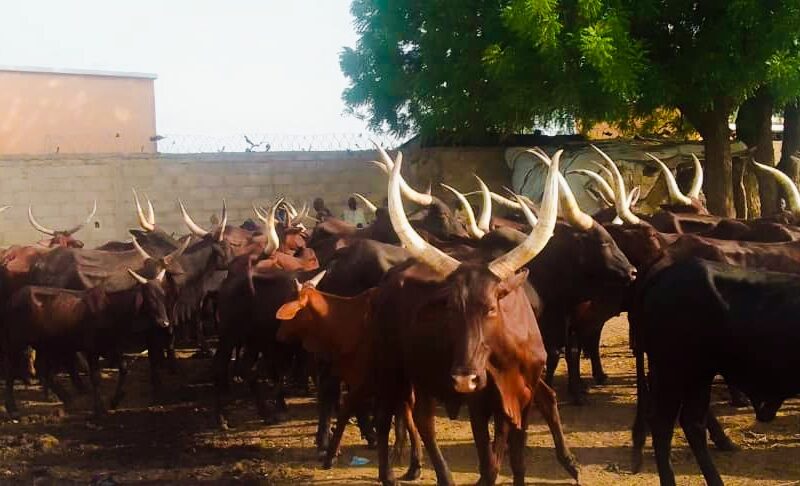Herders grateful as troops recover and return livestock that were stolen during a raid by insurgents on Ngowom village in the Mafa district of Borno State.
Soldiers in Borno State have successfully recovered and returned 142 cattle that were stolen from herders during a raid by insurgents on a village in the Mafa district.
The troops of 112 battalion – under Operation Hadin Kai (OPHK) and based in the Mafa Local Government Area of Borno State – discovered the rustled cattle during counterinsurgency operations on the shores of Lake Chad and the fringes of the Sambisa Forest in the southwestern part of Chad Basin National Park where insurgents have hidden camps.
It was not known if the insurgents were members of the Jamā’at Ahl as-Sunnah lid-Da’way Wa’l-Jihād (JAS), more commonly referred to as Boko Haram, or the Islamic State West Africa Province (ISWAP).
A large group of heavily armed insurgents arrived at Ngowom village on motorbikes and in vehicles on Sunday evening shortly after the Maghrib prayer, which starts at sunset and ends at nightfall.
Residents said the insurgents chased the herders away and stole their cattle.
The herders immediately reported the rustling to soldiers based in the Mafa district.
Members of the 112 battalion came across the stolen cattle while they were conducting a massive clearing operation on the fringes of Sambisa Forest. They were able to recover 142 cattle.
They informed the cattle market management committee which, in turn, told the herders. The animals were taken to the cattle market in Maiduguri, popularly known as “Kasuwan Shanu”. The cattle were returned to their rightful owners on Wednesday, May 29.
Alhaji Hassan Abdullahi, one of the herders whose animals were stolen, told RNI that soldiers managed to return 68 of his 72 livestock.
“The Boko Haram stole 72 of my cattle when they raided Ngowom village. The men were heavily armed and there were many of them. They surrounded us and took our cattle. We could not fight them off.
“The soldiers were only able to recover 68 of my cattle. I don’t know what happened to the other four. They are either still with the insurgents or they might have been killed.
“Still, I am extremely grateful to the soldiers, civilian joint task force [CJTF] members and other security operatives for finding my cattle. They are safe and back with me. May Almighty Allah fortify the security operatives.”
Annayim Jidda, whose animals were also stolen, lost 15 cattle in the raid.
“The insurgents arrived on motorbikes and in vehicles. They were heavily armed. They got to the village shortly after Maghrib prayers. There were many insurgents and they chased us away. We could not fight them.
“Soon after the raid we reported the theft to the military. We did not hold out much hope that we would get our livestock back.
“But, based on intelligence they received from locals in the area, the soldiers were able to conduct a clearance operation in a section of the Sambisa Forest. That’s when they came across our stolen livestock. They were able to recover 142 altogether.
“I got 12 of my 15 cattle back. I really appreciate the efforts the soldiers and other security operatives make to protect the lives and property of herders in the state.”
Ba Grema, a member of the Borno State cattle market management committee and a representative of the Shehu of Borno, Abubakar Ibn Umar Garba Al Amin El-Kanemi, told RNI that this was not the first time the military, CJTF members and other security operatives had recovered and returned livestock to their rightful owners.
“The committee works closely with security operatives. Whenever livestock is stolen, we work with them to try to find the animals and to return them to their owners. By doing so, we have built trust between civilians and the military.
“After the security operatives successfully recovered the cattle, they contacted the committee and delivered the stolen animals to the cattle market. We informed the herders that their cattle had been found. On Wednesday, the herders and their livestock were reunited.”
Grema said the herders were from three main ethnic groups, the Fulani, Shuwa Arab and Kanuri.
“In past times, the relationship between the locals and the military was fractured. Neither side trusted the other. Ordinary people – mostly farmers and herders – feared the military, accusing them of dealing harshly and unlawfully with them. It has taken time to build trust between them.
“But it has become obvious that it is in the people’s favour to support the troops. Since the locals come into contact frequently with insurgents, we encourage them to support the military in their counterinsurgency operations by providing any relevant information or intelligence. We ask them to report any unusual or suspicious movements.
“It is only through cooperation that peace and stability will return to Borno State.”
SHETTIMA LAWAN MONGUNO









